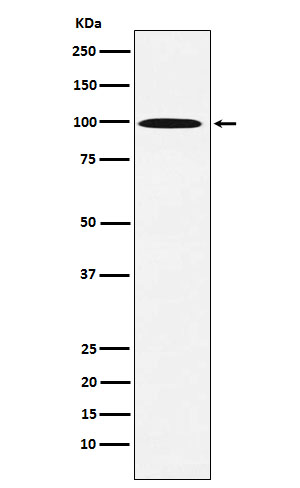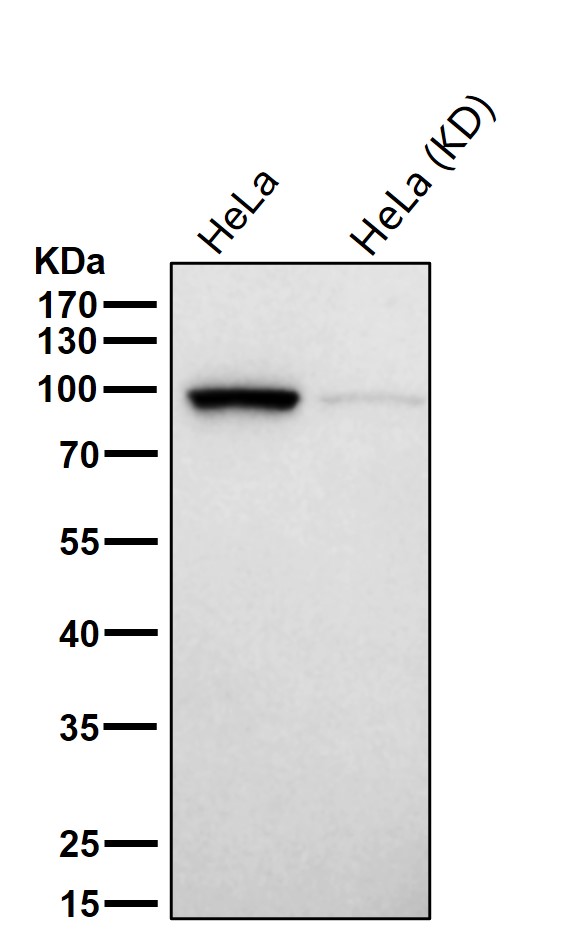

| WB | 1/1000-1/2000 | Human,Mouse,Rat |
| IF | 咨询技术 | Human,Mouse,Rat |
| IHC | 1/100-1/200 | Human,Mouse,Rat |
| ICC | 技术咨询 | Human,Mouse,Rat |
| FCM | 咨询技术 | Human,Mouse,Rat |
| Elisa | 咨询技术 | Human,Mouse,Rat |
| Aliases | ADTG; AP1G1; CLAPG1;;gamma 1 Adaptin |
| WB Predicted band size | Calculated MW: 91 kDa ; Observed MW: 100 kDa |
| Host/Isotype | Rabbit IgG |
| Antibody Type | Primary antibody |
| Storage | Store at 4°C short term. Aliquot and store at -20°C long term. Avoid freeze/thaw cycles. |
| Species Reactivity | Human,Mouse,Rat |
| Immunogen | A synthesized peptide derived from human gamma 1 Adaptin |
| Formulation | Purified antibody in PBS with 0.05% sodium azide,0.05% BSA and 50% glycerol. |
+ +
以下是关于AP1G1抗体的3篇参考文献示例(文献信息为模拟,实际需根据真实文献调整):
---
1. **文献名称**:*"AP1G1 regulates endosomal trafficking and is essential for neuronal development"*
**作者**:H. Yamamoto et al.
**摘要**:通过特异性AP1G1抗体进行免疫染色和蛋白质互作分析,揭示了AP1G1在神经元内体运输中的关键作用,并证明其缺失导致突触蛋白分选异常。
2. **文献名称**:*"Development of a high-affinity monoclonal antibody against AP1G1 for cancer biomarker studies"*
**作者**:L. Chen et al.
**摘要**:报道了一种新型AP1G1单克隆抗体的开发,该抗体在结直肠癌组织中高灵敏检测AP1G1表达,并验证其作为潜在诊断标志物的可能性。
3. **文献名称**:*"AP1G1 mediates viral entry by interacting with envelope proteins: Evidence from antibody-blocking assays"*
**作者**:K. Müller et al.
**摘要**:利用AP1G1抗体进行功能阻断实验,证明AP1G1通过与病毒包膜蛋白互作促进多种RNA病毒(如HIV)的细胞内化。
---
如需真实文献,建议在PubMed或Google Scholar中检索关键词 **"AP1G1 antibody"** 或 **"AP1G1 adaptor protein"**,并筛选近年研究。
AP1G1 (Adaptor Protein complex 1. gamma-1 subunit) is a critical component of the heterotetrameric AP-1 complex, which regulates intracellular protein trafficking between the trans-Golgi network (TGN) and endosomal compartments. The AP-1 complex facilitates clathrin-coated vesicle formation, enabling selective cargo sorting and membrane transport. As the γ-subunit, AP1G1 plays a structural role in stabilizing the AP-1 complex and interacts with accessory proteins to mediate vesicle assembly. It also contains a hinge region that may contribute to conformational changes during membrane binding. Dysregulation of AP1G1 has been linked to disorders like Hermansky-Pudlak syndrome and cancers, where altered membrane trafficking disrupts lysosomal function or cell signaling pathways.
AP1G1 antibodies are essential tools for studying AP-1 complex dynamics, intracellular trafficking mechanisms, and disease pathology. They are widely used in techniques such as Western blotting, immunofluorescence, and immunoprecipitation to detect AP1G1 expression, localization, and interactions. Commercial antibodies are often validated in human, mouse, or rat models, with specificity confirmed via knockout controls. Recent studies also employ AP1G1 antibodies to explore its role in autophagy, viral entry, and neuronal transport, highlighting its broad relevance in cellular physiology and disease research.
×